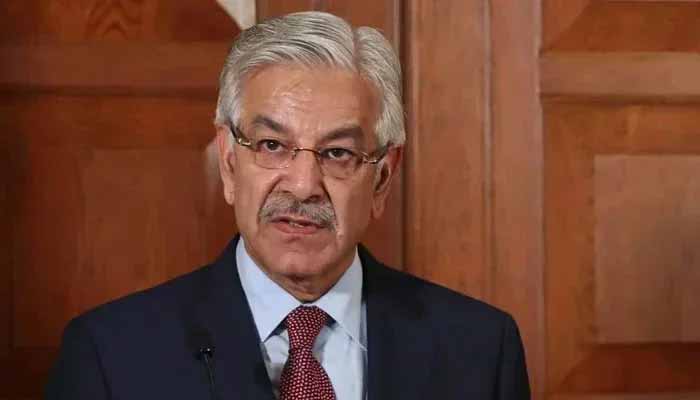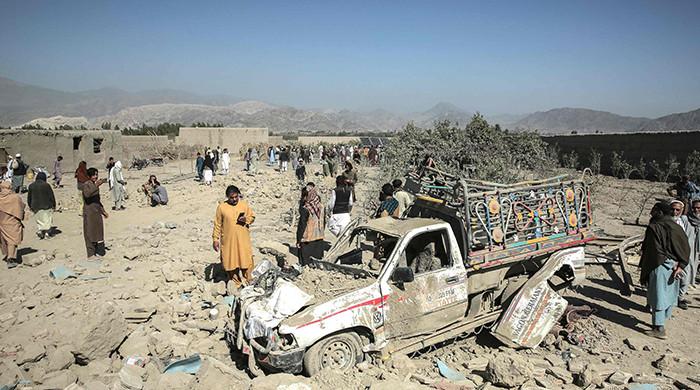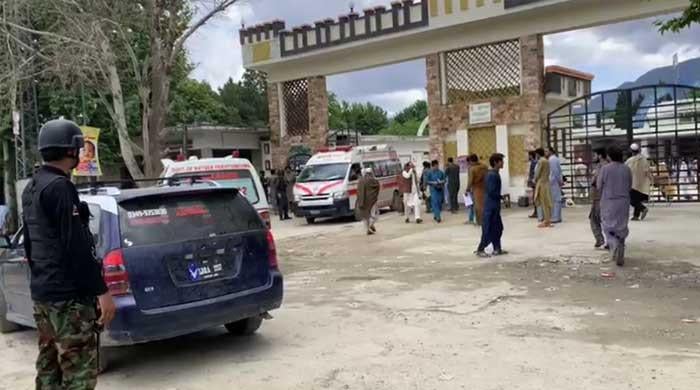Asif issues stern warning to Taliban regime after Pak-Afghan talks collapse in Istanbul
Defence minister warns any terrorist attack or suicide bombing inside Pakistan to give Taliban rulers "bitter taste"
October 29, 2025

- Test our resolve and capabilities at your own peril, Asif warns Kabul.
- Defence minister vows strong response to any cross-border attack.
- Taliban rulers pushing Afghanistan into another conflict: minister
Defence Minister Khawaja Asif on Wednesday issued a stern warning to the Afghan Taliban regime after days of talks in Istanbul between Pakistani and Afghan delegations ended without a breakthrough.
In a post on X, the defence minister said that Pakistan had engaged in talks at the request of brotherly countries in an effort to give peace a chance, but "venomous statements" by certain Afghan officials clearly reflect the devious and splintered mindset of the Taliban regime.
“We have borne your treachery and mockery for too long, but no more. Any terrorist attack or any suicide bombing inside Pakistan shall give you the bitter taste of such misadventures. Be assured and test our resolve and capabilities, if you wish so, at your own peril and doom,” the defence czar posted on X.
Asif further added: “Let me assure them that Pakistan does not require to employ even a fraction of its full arsenal to completely obliterate the Taliban regime and push them back to the caves for hiding. If they wish so, the repeat of the scenes of their rout at Tora Bora with their tails between the legs would surely be a spectacle to watch for the people of the region.”
Defence czar's statement comes hours after Minister for Information and Broadcasting Attaullah Tarar confirmed early Wednesday morning that the four-day talks in Istanbul with the Afghan Taliban had ended without a breakthrough, despite Pakistan repeatedly presenting evidence-backed counterterrorism demands.
“The dialogue thus failed to bring about any workable solution,” Tarar said in an X post after the four-day session ended. He further said Pakistan had long sought cooperation from Kabul against militants targeting the country.
Tarar thanked Qatar, Turkiye, and other friendly nations “for their support and sincere efforts to bring about a peaceful solution to the problem of terrorism.”
The defence minister further accused the Taliban regime of blindly pushing Afghanistan into yet another conflict, just to retain its usurped rule and maintain the war economy that sustains them.
“Despite fully knowing their inherent limitations and the hollowness of their war cries, they are beating the war drums to maintain their crumbling facade. If the Afghan Taliban regime is madly hellbent upon ruining Afghanistan and its innocent people once again, then so be it,” he added.
The defence minister further warned that the Taliban regime, "who have vested interests in the continuation of instability in the region, should know that they have probably misread [Pakistan’s] resolve and courage."
"If the Taliban regime wants to fight us, the world will INSHAALLAH see that their threats are only a performative circus,” Asif added.
Islamabad-Kabul tensions
The two neighbouring nations are witnessing heightened tensions amid the Afghan Taliban regime's reluctance to act against terrorist groups operating from its soil, in the backdrop of rising terror attacks in Pakistan.
The tensions were escalated when the Taliban forces and India-backed Tehreek-e-Taliban Pakistan (TTP), alias Fitna al-Khawarij, resorted to an unprovoked attack on Pakistan on October 12.
The Pakistan Armed Forces gave a befitting response to the aggression, killing over 200 Afghan Taliban and affiliated militants in a self-defence action.
The military's media wing, the Inter-Services Public Relations (ISPR), said that 23 soldiers embraced martyrdom in the clashes with the Taliban forces and the terrorists.
Furthermore, the security forces also conducted “precision strikes” in Afghanistan’s Kandahar province and the capital Kabul, as well as in the border areas of North and South Waziristan districts, successfully destroying multiple strongholds in response to the aggression.
The two sides had agreed on a temporary ceasefire during the Doha talks on October 19 and to hold further meetings to establish a permanent mechanism to ensure peace and stability.











